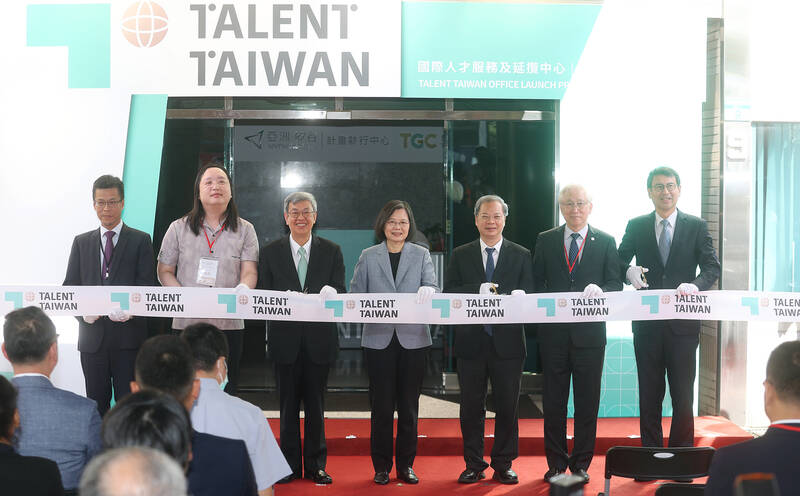The National Development Council (NDC) yesterday officially launched the International Talent Taiwan Office to recruit foreign professionals and help them adjust to life in Taiwan.
The talent office, located at the former NDC office on Songjiang Road in Taipei, is an extension of the Taiwan Employment Gold Card Office that was set up in October 2020 to provide professional consultation services and assistance to Employment Gold Card holders, the council said.
The talent office has expanded the services that were only available to the 8,348 Gold Card holders (as of the end of September) to those with entrepreneur visas and other employed foreign professionals, it said.

Photo: CNA
The one-stop service center is available online and in person, NDC Minister Kung Ming-hsin (龔明鑫) said.
The services include pre-arrival consultations and help for those living in Taiwan, including assistance with housing, banking, children’s education, taxes, insurance and even pets, Kung said.
Two major accounting firms are to provide tax and legal services, he added.
The office aims to make Taiwan’s institutions more friendly and flexible, President Tsai Ing-wen (蔡英文) told reporters at a news conference in Taipei announcing the launch of the office.
“If we are to make Taiwan an innovative place, life and work for talented people has to be made easier,” she said, adding that recruiting international professionals and ensuring they remain in the country would be vital in transforming Taiwan into a key economic power.
Since 2021, the NDC has been conducting interministerial meetings, including with top officials from the Ministry of Economic Affairs, the Ministry of Labor, the Ministry of the Interior and the Overseas Community Affairs Council to help identify foreign professionals, students and intermediate skilled workers that form the main target groups in the country’s recruitment plan, Kung said.
The council is seeking to attract 400,000 workers by 2030, including at least 70,000 professionals, with the rest classified as skilled workers.
Premier Chen Chien-jen (陳建仁), Minister of Digital Affairs Audrey Tang (唐鳳) and Steven Chen (陳士駿), the Taiwanese-American cofounder of YouTube, also attended the launch event.
The Internet entrepreneur was the first Taiwan Employment Gold Card holder and has been described by Tsai as “leaving his mark on Taiwan’s history.”

CHAOS: Iranians took to the streets playing celebratory music after reports of Khamenei’s death on Saturday, while mourners also gathered in Tehran yesterday Iranian Supreme Leader Ayatollah Ali Khamenei was killed in a major attack on Iran launched by Israel and the US, throwing the future of the Islamic republic into doubt and raising the risk of regional instability. Iranian state television and the state-run IRNA news agency announced the 86-year-old’s death early yesterday. US President Donald Trump said it gave Iranians their “greatest chance” to “take back” their country. The announcements came after a joint US and Israeli aerial bombardment that targeted Iranian military and governmental sites. Trump said the “heavy and pinpoint bombing” would continue through the week or as long

TRUST: The KMT said it respected the US’ timing and considerations, and hoped it would continue to honor its commitments to helping Taiwan bolster its defenses and deterrence US President Donald Trump is delaying a multibillion-dollar arms sale to Taiwan to ensure his visit to Beijing is successful, a New York Times report said. The weapons sales package has stalled in the US Department of State, the report said, citing US officials it did not identify. The White House has told agencies not to push forward ahead of Trump’s meeting with Chinese President Xi Jinping (習近平), it said. The two last month held a phone call to discuss trade and geopolitical flashpoints ahead of the summit. Xi raised the Taiwan issue and urged the US to handle arms sales to

BIG SPENDERS: Foreign investors bought the most Taiwan equities since 2005, signaling confidence that an AI boom would continue to benefit chipmakers Taiwan Semiconductor Manufacturing Co’s (TSMC, 台積電) market capitalization swelled to US$2 trillion for the first time following a 4.25 percent rally in its American depositary receipts (ADR) overnight, putting the world’s biggest contract chipmaker sixth on the list of the world’s biggest companies by market capitalization, just behind Amazon.com Inc. The site CompaniesMarketcap.com ranked TSMC ahead of Saudi Aramco and Meta Platforms Inc. The Taiwanese company’s ADRs on Tuesday surged to US$385.75 on the New York Stock Exchange, as strong demand for artificial intelligence (AI) applications led to chip supply constraints and boost revenue growth to record-breaking levels. Each TSMC ADR represents

Pro-democracy media tycoon Jimmy Lai’s (黎智英) fraud conviction and prison sentence were yesterday overturned by a Hong Kong court, in a surprise legal decision that comes soon after Lai was jailed for 20 years on a separate national security charge. Judges Jeremy Poon (潘兆初), Anthea Pang (彭寶琴) and Derek Pang (彭偉昌) said in the judgement that they allowed the appeal from Lai, and another defendant in the case, to proceed, as a lower court judge had “erred.” “The Court of Appeal gave them leave to appeal against their conviction, allowed their appeals, quashed the convictions and set aside the sentences,” the judges